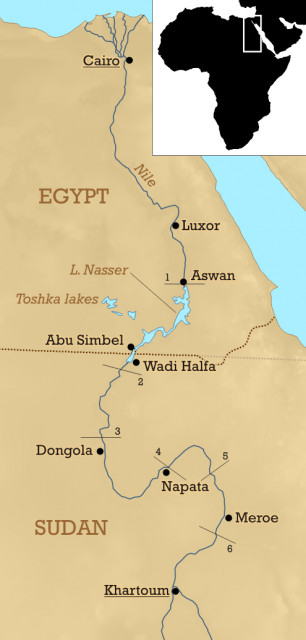Nubia
Nubia, a region along the NILE RIVER, is now divided between southern EGYPT and northern SUDAN. The region takes its name from the Nubians, a distinctive ethnic group who speak languages of the Nubian family. Although there has never been a nation called Nubia, the region has been home to a number of empires and states.
Around 2,000 years ago, Nubian-speaking people began migrating from western Sudan into the Nile Valley. They settled in the Sudanese empire of Kush, a state that maintained a capital in the city of MEROE and that had a long history of interaction with ancient Egypt. Gradually the Nubian languages replaced the old languages of Kush. By the time the empire broke up in the A.D. 300s, the people of the region spoke Nubian languages.

When Christian missionaries entered Nubia in the 500s, they found three well-established kingdoms. Nobadia was in the north on the Egyptian border; farther south was Makuria; and the southernmost kingdom was Alodia (also known as Alwa). All three Nubian kingdoms rapidly accepted Christianity, and the Nubian church became part of the Coptic Orthodox Church of Egypt.
Less than a century after Christianity came to Nubia, Arabs conquered Egypt and introduced the Islamic faith. After Arab forces tried and failed to conquer Nubia, the Arabs made a treaty that guaranteed peace to Nobadia and Makuria for 600 years in exchange for regular shipments of slaves. As a result of this treaty, medieval Nubia was peaceful and prosperous. Art, architecture, and literature all reflected the strong influence of Christianity. Brightly colored paintings on church walls and elaborately decorated pottery were the outstanding artistic achievements of Nubian civilization.
In time, the kingdoms of Nobadia and Makuria were combined under a single ruler, but they had separate administrations. Nobadia used Egyptian money and allowed Arab traders to travel and settle down. The king ruled Makuria more directly and controlled all commerce. The united kingdoms flourished for several centuries, sending gold, ivory, slaves, ebony, and ostrich feathers to Egypt in exchange for cloth, glassware, and wine.
When a different group of Islamic rulers seized power in Egypt in 1250, Nubia began to decline. Egypt's new rulers broke the ancient treaty and launched attacks on Nubia. In the long run, mass migrations of Arab nomads proved more destructive to Nubian civilization than military attacks. Arabs from Egypt and the Arabian peninsula overran Makuria and Alwa, where Arabic gradually replaced the Nubian languages.
Although Christianity survived for a while in a small kingdom called Dotawo, it had disappeared by the late 1600s. After the end of the fifteenth century, information about Dotawo is primarily based on archaeological evidence, as the historical record for the region vanishes for several centuries. Archaeologists have determined that after lower Nubia was taken over by the Ottoman Empire near the end of the seventeenth century, all traces of Christianity and the Nubian church disappeared. The people of the region converted to Islam, though they continued to speak Nubian rather than Arabic.
Today there are about 1.2 million speakers of Nubian living in Egypt and Sudan. The name Nubia now applies only to the region they traditionally occupied, from Aswan south to Ed Debba in Sudan. The building of the Aswan High Dam in the 1960s flooded much of Nubia, requiring some inhabitants to be resettled in distant parts of Egypt and Sudan. (See also Egypt, Ancient; Copts.)